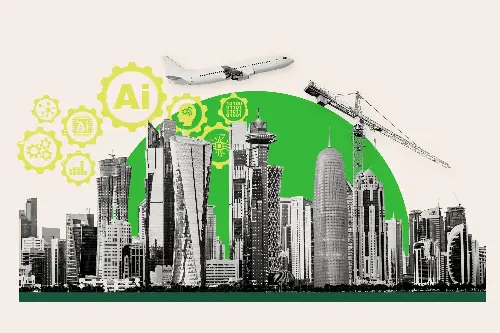
A report released on Monday by the United Nations Environment Programme found the world is approaching an important tipping point in the greenhouse gas emissions that come from the construction and operation of buildings.
"The buildings where we work, shop and live account for a third of global emissions and a third of global waste," UNEP Executive Director Inger Andersen said in a statement accompanying the report's release.
The good news, Andersen said, is that emissions from buildings have stopped increasing for the first time since 2020 when the global pandemic forced a slowdown in construction. Andersen said that shows that government actions such as new building codes and investments in efficiency are working.
The bad news, she said, is that those actions are not working fast enough and the "sluggish" progress on policy and financing in the building sector puts global climate goals at risk.
"We must do more and do it faster," Andersen said.
Many emerging technologies promise to cut the carbon emissions that come from the production of construction materials such as cement and steel, the report found. Advances in digital technology such as generative artificial intelligence and large language models also play a big part in making our built environment more sustainable.
"AI in particular can play an important role," Oliver Rapf, lead author of the UNEP report and executive director of the Buildings Performance Institute Europe, said in a briefing for reporters. Rapf said his organization has identified AI and the virtual modeling technique known as "digital twinning" as key technologies for reducing the emissions from buildings.
"They can also improve affordability of new high-efficiency buildings," Rapf said.
City planners, architects and designers and the operations managers at some of the nation's biggest corporate campuses and busiest airports are all finding uses for AI as they seek to cut costs and emissions in some of the most ubiquitous but often overlooked parts of our environment.
"Buildings are everywhere," Bert Van Hoof, CEO at the digital twin development company Willow, told Newsweek. "A big part of our mission is to fundamentally change how these things are being managed with the good of the planet in mind."
'Everything Is Getting Connected'
Sustainable design and construction of new buildings has advanced remarkably since the green building certification system Leadership in Energy and Environmental Design (LEED) was developed in the 1990s.
But buildings aren't just built, Van Hoof said, they also must function.
"They need to be managed, maintained and operated smartly for the next 100 years," he said.
That's where Willow's digital twin software platform comes in, helping the people responsible for management and maintenance of buildings make better decisions. The explosion in sensory technology such as smart thermostats and appliance controls means building managers have a growing flow of data.
A couple of decades ago, a building operator might have had data on the energy going into heating, cooling and lighting.
"Now, everything is getting connected," Van Hoof said.
Today's building manager could be getting instant feedback from elevators and other conveyances, the refrigeration systems in kitchens and laboratories, and the energy used by EV charging stations. The growth of distributed energy such as rooftop solar and on-site battery storage also means managers must track energy inputs along with outputs.
"There's a lot of solutions, many more sensing capabilities, so how do we bring all of this together in one place and then also understand how the systems fit into the bigger spatial context?" Van Hoof said.
AI offers ways to sort through the data to get answers quickly and help managers prioritize the things that really matter.
Willow clients include Walmart, SoFi Stadium in Los Angeles and Dallas Fort Worth International Airport. The company estimates that it has helped clients save about 20 gigawatt hours of annual avoidable energy use, on par with the yearly energy consumption of a major city.
Helping to Find 'Holistic Equations'
Sumana Nallapati is chief information officer for Denver, a place where sustainability issues loom as large as the Rocky Mountain views that attract people to the city.
"We care deeply about our mountains, we care about our lifestyle, we care about climate," Nallapati told Newsweek. "It runs in every Coloradan."
Denver has set ambitious citywide goals to cut greenhouse gas emissions. Denver's Office of Climate Action, Sustainability and Resiliency estimates that commercial buildings and homes represent more than 60 percent of the city's total emissions, and the goal is to have all new buildings achieve net-zero energy by 2030.
Nallapati said she sees a big role for AI to help the city achieve that goal while also working to address other challenges.
"When we think about affordable homes, when we think about the problems that we have with homelessness, it's a holistic equation, right?" she said.
Denver is leaning into AI solutions at the city level, hosting the first DenAI Summit last September with tech leaders such as LinkedIn co-founder Reid Hoffman and former Google CEO Eric Schmidt. Panel topics included a session on AI for sustainability, and Nallapati said the city aims to make the conference an annual event.
The city's net-zero goal will require coordinating massive amounts of data about energy use, renewable energy production and building construction codes, tasks that Nallapati said can be aided by AI tools.
"We want the transformational work done by humans and the transactional work done by chat bots," Nallapati said. "We want to take the mundane, repetitive tasks out of our workflow and make the humans just focus on the things that truly matter, whether it's sustainability and the environment or customer service."
Nallapati will help Newsweek assess some of the best ways that cities are putting the technology to work as a judge in the first AI Impact Awards. The awards will recognize innovative AI solutions that solve critical issues. Entries are open until April 25, and finalists and winners will be announced in late May ahead of the AI Impact Summit in June.
